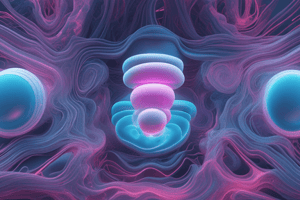Podcast
Questions and Answers
Which echogenicity is characterized by displaying black on an ultrasound image?
Which echogenicity is characterized by displaying black on an ultrasound image?
- Anechoic (correct)
- Hyperechoic
- Hyperreflective
- Isoechoic
What is the primary use of a linear transducer?
What is the primary use of a linear transducer?
- Superficial structures imaging (correct)
- Cardiac imaging
- Higher depth scans
- Deep abdominal imaging
In which ultrasound mode does motion of structures get visualized over time?
In which ultrasound mode does motion of structures get visualized over time?
- Color Doppler
- M-mode (correct)
- B-mode
- Power Doppler
What artifact is typically seen when ultrasound waves are absorbed by a solid structure?
What artifact is typically seen when ultrasound waves are absorbed by a solid structure?
Which Doppler technique shows continuous venous flow in a band-like shape?
Which Doppler technique shows continuous venous flow in a band-like shape?
What is the effect of increasing gain on an ultrasound image?
What is the effect of increasing gain on an ultrasound image?
What is the reason behind needing a full bladder during a pelvic ultrasound?
What is the reason behind needing a full bladder during a pelvic ultrasound?
Which artifact occurs due to sound waves bouncing between two layers of lung pleura?
Which artifact occurs due to sound waves bouncing between two layers of lung pleura?
Flashcards
Hyperechoic
Hyperechoic
A tissue that appears bright white on an ultrasound image.
Anechoic
Anechoic
A tissue that appears black on an ultrasound image, representing fluid.
Linear transducer
Linear transducer
Ultrasound probe good for superficial structures, offering high resolution and lower depth.
2D Ultrasound
2D Ultrasound
Signup and view all the flashcards
Color Doppler
Color Doppler
Signup and view all the flashcards
Posterior Enhancement
Posterior Enhancement
Signup and view all the flashcards
Shadowing (Ultrasound)
Shadowing (Ultrasound)
Signup and view all the flashcards
M-Mode Ultrasound
M-Mode Ultrasound
Signup and view all the flashcards
Study Notes
Ultrasound Techniques
- Transverse plane: probe to the right side of the head
- Longitudinal plane: probe to the head
- Echogenicity:
- Hyperechoic: white (bone, ligaments, dura, nerves)
- Isoechoic: gray (muscles, muscle striation)
- Anechoic: black (fluid, CSF, blood)
- Transducer Points:
- Linear: lower depth, high resolution (superficial structures, vessels, nerves, eyes)
- Curvilinear: higher depth, lower resolution (abdominal, renal, obstetrics)
- Phased array: higher depth, lower resolution (cardiac, lungs)
- Ultrasound Modes:
- 2D/B-mode: most common, brightness mode, different gray shades for 2D imaging
- M-mode: motion mode, captures ultrasound images in a single line over time, shows movement of structures
- Color Doppler: shows blood flow or tissue movement; red indicates flow towards transducer, blue away
- Pulsed Doppler: depicts venous flow (continuous band-like shape) and arterial flow (triangular shape); measures blood flow
- Power Doppler: detects very low flow states; useful for assessing blood flow
- Ultrasound Functions:
- Gain: controls overall echo strength (brightness)
- Depth: adjusts the depth of the image
- Improving Image Acquisition:
- Probe pressure: crucial for proper image capture
- Fanning/rocking/sliding: crucial for proper image capture
- Respiratory assistance: important for keeping the patient still
- Ultrasound Artifacts:
- Shadowing: caused by absorption of ultrasound waves by solid structures (e.g., gallstones, kidney stones, bone)
- Edge shadowing:
- Posterior enhancement: substance behind an echo-free substance appears brighter (fluid, example)
- Reverberation: ultrasound waves bounce between two tissues, visualized as a-lines (lungs)
- Comet tail: produced by strong reflectors (e.g., air bubbles)
- Ring down: produced by fluid collection surrounded by air bubbles; needs 3 "B-lines" in one view to be pathological
Studying That Suits You
Use AI to generate personalized quizzes and flashcards to suit your learning preferences.




